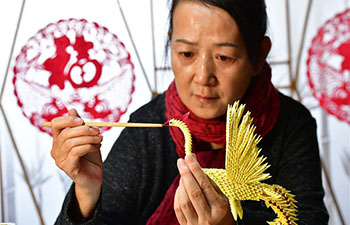HONG KONG, Jan. 4 (Xinhua) -- A new class of cyanine compounds that can be used for detection of Alzheimer's disease was discovered by researchers from Hong Kong Baptist University which made the findings public on Thursday.
Alzheimer's disease, a kind of neurodegenerative disorder, is characterized by the formation of amyloid plaque in human brains.
Clinical evaluation, cognitive tests and neuroimaging are commonly used to diagnose the disease, but are only effective after symptoms appear. Moreover, neuroimaging, such as magnetic resonance imaging, requires injecting contrast agents into a person that may bring health risks.
The proteins of interest in human's cerebrospinal fluid are linked to Alzheimer's disease. The versatile detection assay using the compounds developed by the research team requires only a few microliters of the sample fluids to reliably quantify the target proteins.
The detection assay developed by the team is fast, cheaper and more sensitive than traditional commercially available biological methods.
Li Hung-wing, associate professor of the university's Department of Chemistry, said that the newly developed assay will be particularly useful as a low-cost yet accurate diagnostic and prognostic tool for Alzheimer's disease.
It can also serve as a novel alternative non-invasive tool for population-wide screening for the disease. This scientific detection assay has a high potential to serve as a practical diagnosis tool, Li added.
The study was published in internationally renowned academic journal Chemical Science.

















